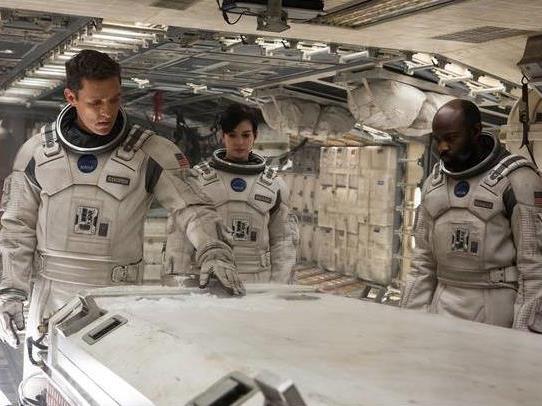Image: supplied
Interstellar promises both. In themes and in dialogue, the film reinforces its striving sensibilities as it tells a tale steeped in exploration and sacrifice, speaks of nobility and the need for the greater good, and quotes Dylan Thomas. In visuals, from dusty crop fields to towering waves to frozen faraway planets, not to mention renderings of robotic helpers, disastrous crashes and other inventive developments, it endeavours to ape and exceed its sci-fi genre compatriots. But, in an effort all about believing in going beyond the standard and the limits in the name of life and love, does the reach of Christopher Nolan’s latest feature exceed its grasp?
Once an aerospace pilot and engineer, now a corn farmer, Cooper (Matthew McConaughey, Dallas Buyers Club) is Interstellar’s protagonist and poster child for venturing further as he raises his children Tom (Timothée Chalamet, Men, Women and Children) and Murph (Mackenzie Foy, The Conjuring) in a near-future setting. At a time when food is scarce, hunger is plentiful and nature has trumped technology as society’s focus, he remains enamoured with science, investigation and everything above, curiosity Murph shares. Their communal inquisitiveness leads them to Professor Brand (Michael Caine, Now You See Me), a physicist with a species-saving mission in need of Cooper’s skills and determination. With fellow astronauts Amelia (Anne Hathaway, Rio 2), Doyle (Wes Bentley, Lovelace) and Romilly (David Gyasi, Cloud Atlas), he leaves his family behind to chart a course through a wormhole to find a planet that can next play host to humanity, perhaps the ultimate quest for survival.
In his first non-franchise film since 2010’s Inception, Interstellar marks a return of many kinds for writer/director Nolan, most recently known for his moodily masterful work on Batman Begins, The Dark Knight and The Dark Knight Rises. The helmer’s output, superhero-oriented and not, has created murky worlds filled with trials and trickery that echoes through the characters, the narrative, and each feature’s very construction. In a non-linear manner, he teases problems and answers as well as causes and effects, always displaying the same unflinching obsession as his protagonists as the likes of Memento, Insomnia and The Prestige have shown. Here, he repeats his established feats in space, affording a grand canvas for his probing, questioning and searching.
Indeed, his setting opens up a wealth of possibilities, even if most have already been traversed by the film’s obvious peers. Interstellar seemingly embraces the pool of movies playing in the same territory, from 2001: A Space Odyssey to Solaris to Contact to Sunshine to Gravity and more, layering the best of their concepts and aesthetics with evident affection and technical proficiency. The former allows the latter to shine for the requisite jaw-dropping result, every twist in the plot accompanied by dazzling visuals from cinematographer Hoyte Van Hoytema (Her) and the special effects team. The scientific and existential ideas each segment filters through are as sprawling as the lengthy 169-minute offering, but again come with clear knowledge of and nods to the ghosts of science fiction past.
All the right scenes are weaved together and all the right genre beats are struck, yet what disturbs the celebratory sci-fi waters is the film’s emotional tone. The sentiment flies thick and fast in what seems to be Nolan’s tribute not to Stanley Kubrick but to Steven Spielberg. This proves his biggest mis-step, boiling everything down to the importance of love, and emphasising the point at all possible opportunities. The reliance upon feeling rather than thinking grates in an effort that simultaneously over explains in clumsy, philosophising conversations and monologues but says nothing beyond its core message.
Of course, a level of overt earnestness is to be expected when the crux of the feature, as co-written with the helmer’s brother Jonathan Nolan (TV’s Person of Interest), hones in on the bond between a father and daughter, though not the broad strokes with which it is painted. Performances that are adequate, for certain, without showing any of the lauded cast – including Casey Affleck (Out of the Furnace) and Jessica Chastain (The Disappearance of Eleanor Rigby) as adult versions of the Cooper children, as well as Ellen Burstyn (Draft Day) and John Lithgow (Love is Strange) – at their best, do little to improve the mawkish tenor.
So it is that Interstellar both delivers and deviates from its awe-inspiring mission. The idealistic film dreams big and encourages others to do the same as Nolan creates a modern sci-fi amalgam. Yet, his efforts threaten to come undone every time it shouts its romanticised notions at the audience – as the bellowing timbre of Hans Zimmer’s (The Amazing Spider-Man 2) score is want to do, ironically to the purposeful detriment of select spoken passages. The good intentions are there, as is the stylistic bombast, but in the softness and lack of subtlety of an offering that implores its audience to be moved or else, there can be nothing more than a modest outcome.
Rating: 3 stars out of 5
Interstellar
Director: Christopher Nolan
USA / UK, 2014, 109 mins
Release date: November 6
Distributor: Roadshow
Rated: M
Actors:
Director:
Format:
Country:
Release:





